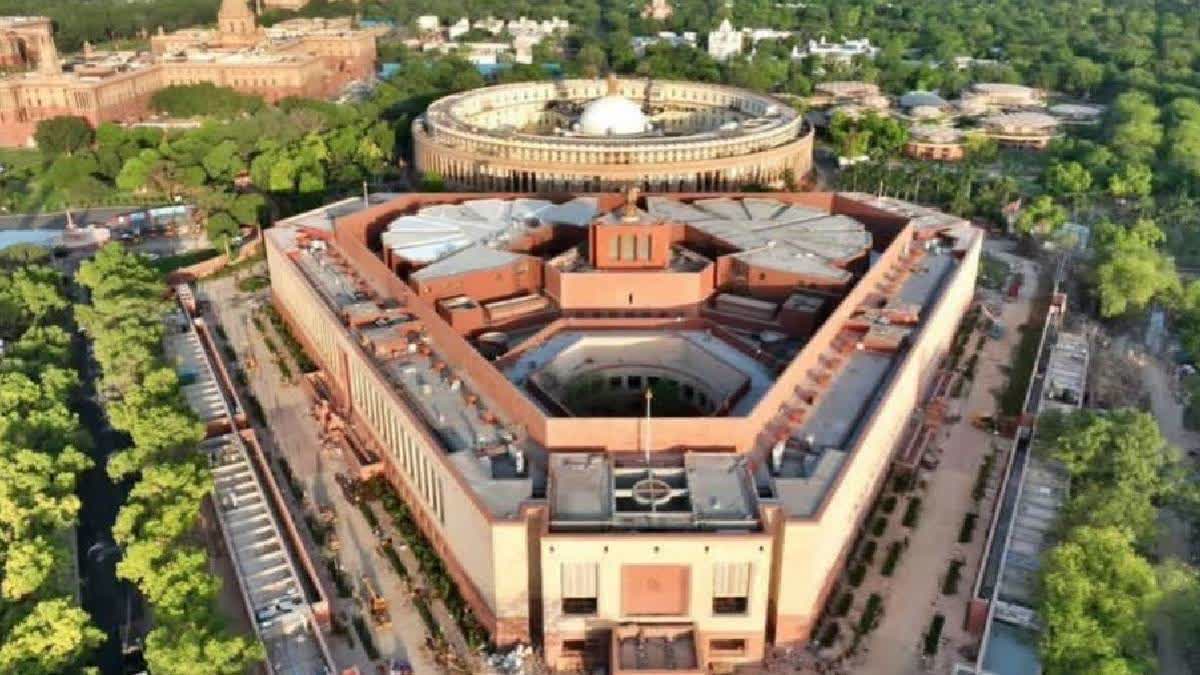Hyderabad: Inaugurating the magnificent new Parliament building, India stands on the precipice of history. A nation teeming with 1.4 billion citizens, each with their unique dreams and aspirations, now has a symbol that reflects the synergy of modernity and rich cultural heritage. This architectural marvel is not just a testament to India's progress but an embodiment of the hopes and dreams of its people. As this imposing structure prepares to host the deliberations of the two houses of Parliament, it is a reminder of the vital role this institution plays in shaping the nation's future.
The Parliament, the supreme legislative body of the world's largest democracy, shoulders the colossal responsibility of crafting laws and policies that ensure the welfare and prosperity of every Indian. This pivotal role has, over the years, witnessed a transformation in the nature of parliamentary proceedings. Gone are the days of graceful and inspiring debates led by luminaries such as Pandit Nehru, Sardar Patel, Govind Vallabh Pant, Krishna Menon, and Madhulimaye. These stalwarts, regardless of their political affiliations, delivered speeches that exemplified their unwavering commitment to public service.
However, contemporary parliamentary sessions are a far cry from the past. What was once an arena for constructive dialogue has, regrettably, become an exhibition of grandstanding and theatrics by some members. Instead of reasoned discussions, we now witness the cacophony of shouting, mockery, walkouts, and endless protests. Bills are often pushed through with insufficient scrutiny, leaving little room for the robust questions and answers necessary for holding the government accountable in both houses. This deterioration in the quality of parliamentary discourse has severely eroded public respect for the institution, as noted by Speaker PA Sangma two and a half decades ago when he lamented that "the highest legislative body has been reduced to the level of a boat club."
More recently, Lok Sabha President Ombirla expressed his dissatisfaction with the way both the ruling party and the opposition obstructed the proceedings of the assembly. It is evident that the eroding parliamentary standards are undermining our faith in our elected representatives and, by extension, our democratic system.
One of the primary functions of the legislature is to scrutinize the government's actions on public issues, rectify policy shortcomings, and provide suggestions for better governance. Every member of Parliament, as a representative of the people, should have an equal opportunity to voice their concerns and ideas. However, the number of days the Houses convene has been dwindling over the years. The first Lok Sabha, from 1952 to 1957, met for an average of 135 days annually. In stark contrast, between 2014 and 2019, the Lok Sabha convened for an average of only 66 days per year. This declining trend is in stark contrast to other democracies like the United States, the United Kingdom, Japan, Canada, Germany, and many more, where their Houses of Representatives meet for more than a hundred days each year. These extended sessions provide ample space for comprehensive discussions, with active participation from both ruling and opposition parties.
In India, where the voices of leaders are celebrated as the cradle of democracy, it seems the opposite is occurring. The true measure of Parliament's performance is its contribution to the nation's development and the well-being of its people. To this end, it is imperative to increase the number of sessions held in the new Parliament building, restore and uphold parliamentary traditions, and reestablish the two houses as the guiding compass steering our nation towards a prosperous future.
The new Parliament building is not just a marvel of architecture but a testament to India's diverse and pluralistic culture. The materials used in its construction and the artworks adorning its walls are a mosaic of the country's myriad traditions. It's vital to acknowledge that different regions of the country have distinct needs and aspirations. Dissenting voices must be respected and given a platform. This spirit of 'Ek Bharat, Shrestha Bharat' (One India, Best India) can only thrive if the ruling party demonstrates statesmanship and refrains from suppressing opposing views through sheer majority.
In this regard, the role of opposition parties is equally crucial. Effective governance thrives on checks and balances. The opposition should play its role effectively by offering reasonable criticism and constructive suggestions for the welfare of the people. It is paramount that both the government and the opposition collaborate meaningfully for the nation's benefit, setting aside narrow political considerations.
Also Read: Historic Transition: Indian Parliament moves to new home amidst grand ceremony
As we stand witness to the inauguration of the new Parliament building, we hope that all political parties and their members will heed the call for responsible governance. It is only through their concerted efforts that the progress of Indian democracy will proceed on a smoother path, reflecting the collective aspirations of our great nation. The new Parliament building symbolizes both the richness of our cultural heritage and the promise of modernity. Now, it is incumbent upon our elected representatives to ensure that its hallowed halls reverberate with the echoes of reasoned debates and informed decisions, fulfilling the aspirations of the 1.4 billion people they represent.
Also Read: New Parliament building: Maneka Gandhi, Shibu Soren and Manmohan Singh to speak in joint sitting



